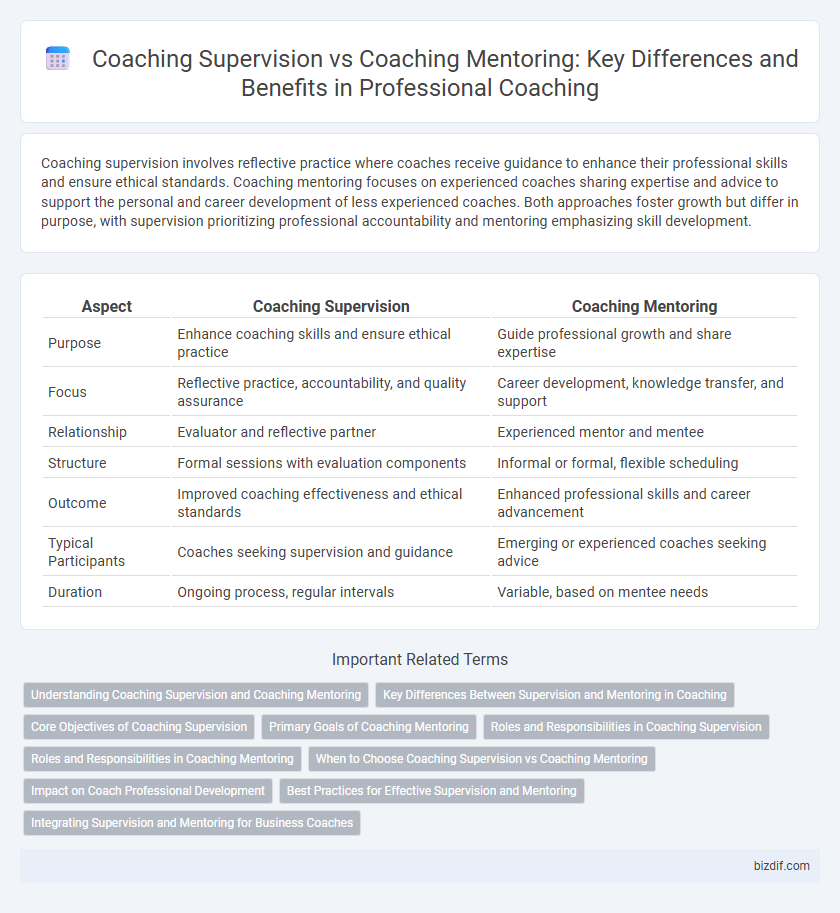Coaching supervision involves reflective practice where coaches receive guidance to enhance their professional skills and ensure ethical standards. Coaching mentoring focuses on experienced coaches sharing expertise and advice to support the personal and career development of less experienced coaches. Both approaches foster growth but differ in purpose, with supervision prioritizing professional accountability and mentoring emphasizing skill development.
Table of Comparison
| Aspect | Coaching Supervision | Coaching Mentoring |
|---|---|---|
| Purpose | Enhance coaching skills and ensure ethical practice | Guide professional growth and share expertise |
| Focus | Reflective practice, accountability, and quality assurance | Career development, knowledge transfer, and support |
| Relationship | Evaluator and reflective partner | Experienced mentor and mentee |
| Structure | Formal sessions with evaluation components | Informal or formal, flexible scheduling |
| Outcome | Improved coaching effectiveness and ethical standards | Enhanced professional skills and career advancement |
| Typical Participants | Coaches seeking supervision and guidance | Emerging or experienced coaches seeking advice |
| Duration | Ongoing process, regular intervals | Variable, based on mentee needs |
Understanding Coaching Supervision and Coaching Mentoring
Coaching supervision provides coaches with structured reflection opportunities to enhance ethical practice, develop skills, and ensure client safety through case discussions and feedback. Coaching mentoring focuses on personal and professional growth by sharing experience, offering guidance, and supporting the coach's career development. Understanding the distinct purposes helps coaches select appropriate support for improving competence and confidence in their practice.
Key Differences Between Supervision and Mentoring in Coaching
Coaching supervision centers on enhancing the coach's professional development through reflective practice, ethical guidance, and accountability, focusing on the coaching process and client outcomes. Coaching mentoring emphasizes sharing experience, knowledge, and career advice to support the coach's growth, often involving a more experienced coach guiding a less experienced one. Key differences include the purpose--supervision aims at quality assurance and ethical standards, while mentoring focuses on personal and professional growth within the coaching journey.
Core Objectives of Coaching Supervision
Coaching supervision centers on enhancing the coach's reflective practice, ethical accountability, and professional development to ensure high-quality client outcomes. It provides a structured space for coaches to critically evaluate their methodologies, emotional responses, and decision-making processes. Unlike coaching mentoring, which emphasizes skill transfer and career guidance, coaching supervision prioritizes safeguarding client welfare and continuous improvement in coaching effectiveness.
Primary Goals of Coaching Mentoring
Coaching mentoring primarily aims to enhance the mentor's professional development by providing guidance, support, and feedback based on extensive experience within the coaching field. This process focuses on refining coaching skills, expanding knowledge, and fostering personal growth to improve overall coaching effectiveness. Unlike coaching supervision, which emphasizes accountability and ethical practice, mentoring centers on skill-building and career advancement through a collaborative and supportive relationship.
Roles and Responsibilities in Coaching Supervision
Coaching supervision primarily involves overseeing a coach's practice to ensure ethical standards, enhance skills, and support professional growth, while coaching mentoring focuses on sharing personal experience and guidance within specific coaching contexts. Supervisors hold responsibilities such as reflective practice facilitation, timely feedback provision, and safeguarding client-coach boundaries. This structured support system helps maintain accountability and continuous development in coaching competencies.
Roles and Responsibilities in Coaching Mentoring
Coaching mentoring involves experienced coaches guiding less experienced coaches by sharing knowledge, skills, and professional development strategies to enhance coaching effectiveness. The mentor acts as a role model, providing feedback, support, and encouragement, while focusing on the mentee's growth and confidence in their coaching practice. Responsibilities include facilitating reflective learning, fostering ethical standards, and promoting the mentee's self-awareness and professional identity within the coaching field.
When to Choose Coaching Supervision vs Coaching Mentoring
Coaching supervision is essential when seeking reflective practice to enhance professional skills and address ethical dilemmas, while coaching mentoring is ideal for career development and gaining specific industry insights. Choose coaching supervision to improve coaching techniques and ensure accountability, especially during complex client cases. Opt for coaching mentoring when aiming to expand leadership capabilities and receive personalized guidance on career progression.
Impact on Coach Professional Development
Coaching supervision provides a structured framework for reflective practice, enhancing a coach's self-awareness and ethical decision-making, which directly improves coaching effectiveness and client outcomes. Coaching mentoring offers experiential guidance from seasoned professionals, accelerating skill acquisition and fostering career growth through personalized feedback and networking opportunities. Both contribute significantly to a coach's professional development by addressing complementary aspects of skill refinement and strategic career advancement.
Best Practices for Effective Supervision and Mentoring
Effective coaching supervision involves regular reflective practice, structured feedback, and adherence to ethical guidelines to enhance professional development and accountability. Coaching mentoring emphasizes personalized guidance, skill development, and experiential learning tailored to the mentee's goals and challenges. Both practices benefit from clear communication, goal setting, and ongoing evaluation to maximize coaching outcomes and foster continuous improvement.
Integrating Supervision and Mentoring for Business Coaches
Integrating coaching supervision and mentoring enhances business coaches' effectiveness by combining reflective practice with experiential guidance. Coaching supervision focuses on ethical standards, professional development, and case analysis, while mentoring offers personalized support, career advice, and skill-building based on experience. Together, they create a comprehensive framework that nurtures continuous learning, accountability, and advanced coaching competencies for sustainable client success.
Coaching Supervision vs Coaching Mentoring Infographic

 bizdif.com
bizdif.com